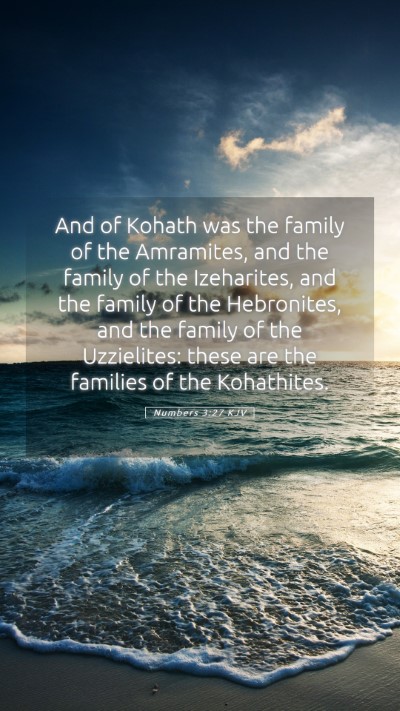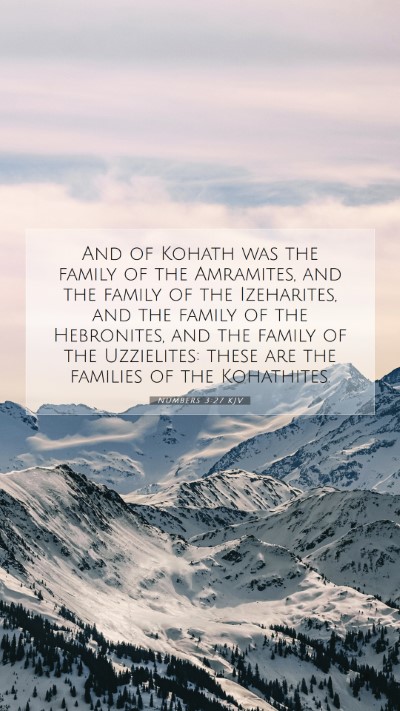Bible Verse Interpretation for Numbers 3:27
Verse: Numbers 3:27 - "And of the sons of Merari; and by their families; the family of the Libnites and the family of the Shimeites: these are the families of Merari."
This verse introduces the descendants of Merari, one of the sons of Levi, emphasizing their role and familial divisions within the Levitical tribe. Below, we will explore the meaning and significance of this verse through various public domain commentaries, offering insights into its implications for understanding scripture.
Understanding the Context
The context of this scripture falls within the Book of Numbers, which outlines the organization of the Israelites in their journey through the wilderness. The Levitical tribe played a crucial role in spiritual leadership and service, and the division of responsibilities among the Levites is essential for understanding the establishment of worship in Israel.
Bible Verse Meanings and Interpretations
1. Family Structure of the Levites
According to Matthew Henry, the mention of specific families within the tribe serves to organize the people more effectively for service to God. This division illustrates the respect for lineage and responsibilities assigned to each family, maintaining order in spiritual tasks in the tabernacle.
2. The Sons of Merari
Albert Barnes notes that Merari’s descendants were responsible for transporting the heavier components of the tabernacle, such as boards, pillars, and sockets. This physical labor is integral to the functioning of worship and signifies the importance of various roles within the community.
3. Spiritual Significance
Adam Clarke emphasizes that this structure not only depicts the physical organization but also serves a spiritual purpose. Each family within the tribe of Levi symbolizes different aspects of service to God, illustrating that every role within the church community is vital for collective worship.
Theological Implications
- Diversity in Service: The families within the tribe of Levi demonstrate how God utilizes diverse talents and roles to accomplish His purposes. This might reflect the body of Christ where each member has a unique function (1 Corinthians 12:12-27).
- Significance of Order: The structured organization of the Levites illustrates God’s desire for order in worship and community life. This theme is reiterated throughout scripture as seen in 1 Corinthians 14:40, which speaks to performing all things decently and in order.
- Historical Context and Fulfillment: The role of Levites foreshadows the New Covenant's priesthood. Just as the Levites were set apart for holy service, so the believers today are a royal priesthood, called to serve and worship God (1 Peter 2:9).
Application to Daily Life
Understanding Numbers 3:27 encourages individuals to recognize their unique roles within their communities, be it in a church setting or broader social interactions. Acknowledging that every person has a specific purpose reinforces the idea of unity in diversity, fostering teamwork and cooperation.
Related Bible Cross References
- Exodus 6:16-20 - The genealogy of the Levites.
- Leviticus 10:8-11 - The duties of the priests.
- 1 Chronicles 6:62 - Enumeration of the Levites’ cities.
Conclusion
In summary, Numbers 3:27 encapsulates essential components of Bible study insights regarding family structure, roles of service, and order within God’s community. As we seek Bible verse meanings and interpretations, this verse reminds us of our individual contributions to the body of Christ, encouraging believers in their unique callings.


